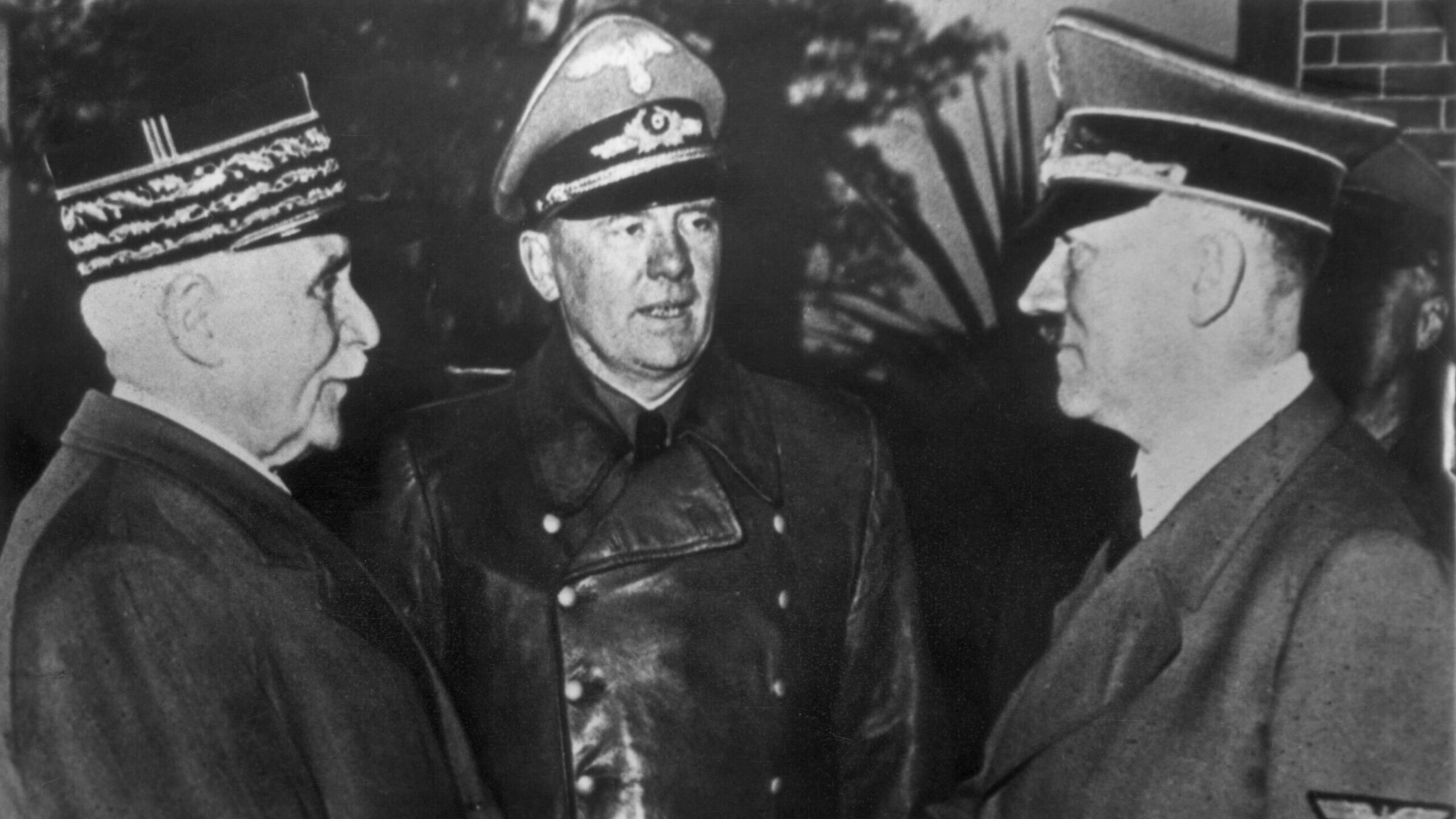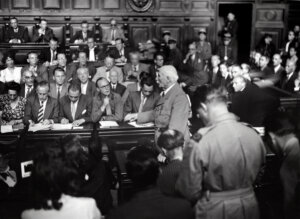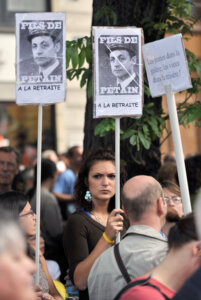In an unsettling account of French collaboration with Nazis, disturbing parallels with today’s politics
The case of Marshal Pétain may be history — but that history is far from over

Marshal Pétain and Adolf Hitler shake hands while an interpreter stands between them, 1940. Photo by Getty Images
France on Trial: The Case of Marshal Pétain
By Julian Jackson
Harvard University Press, 480 pages, $35
On June 17, 1940, Marshal Philippe Pétain made a radio broadcast to the French people. The previous day, the octogenarian military hero had been named the head of both a government and a nation on the run, quite literally, from German war planes and tanks. After announcing that he was seeking an armistice with Nazi Germany, Pétain sought to buffer the shock of defeat by offering “the gift of my person” to his fellow French citizens.
Unhappily, Pétain subsequently also offered the gift of collaboration to his fellow head of state, Adolf Hitler.
One result of all this gifting is that three-quarters of a century later, Pétain and his short-lived stewardship of France — the period known as “Vichy,” much to the frustration of the spa town where Pétain and his government resided between 1940 and 1944 — remains the gift that does not stop giving to French politics and polemics.
There have been several skirmishes this year alone over the meaning and memory of Pétain. Earlier this month, the journalist and politician Éric Zemmour, the son of French Algerian Jews who emigrated to France, was again in court. The leader of the extreme right-wing party Reconquête! stands accused of “disputing crimes against humanity” with his claim, made a few years ago, that Pétain had “saved the lives of Jews.” France’s highest appeals court, the Cour de Cassation, unpersuaded both juridically and ethically by Zemmour’s explanation that he meant only “French Jews,” has now reopened the case.
A second example occurred a few months earlier when the French Prime Minister Élisabeth Borne, whose Jewish father survived Auschwitz only to commit suicide several years later, described the other and larger extreme right-wing party Rassemblement National, led by Marine Le Pen, was the ideological “heir of Pétain.” Tweeting her outrage, Le Pen declared that Borne’s claim was “unacceptable for the nation’s largest opposition party.”
Borne is among those political figures, however, who find unacceptable the normalization of a party founded by the Holocaust denier Jean-Marie Le Pen. (One measure of the RN’s “de-demonization” is that even Borne’s boss, President Emmanuel Macron, rapped her knuckles for the remark.)
France’s complicity in ‘an irreparable act’
The persistence of the Pétain’s chapter in French politics is but one reason to welcome Julian Jackson’s new book France on Trial: The Case of Marshal Pétain. As the author of A Certain Idea of France, a brilliant biography of Charles de Gaulle, and France: The Dark Years, which recounts the history of Vichy, Jackson is uniquely qualified to tell this story. Few historians know 20th century France as well as Jackson, and fewer historians write as well as he does. His account of the trial moves seamlessly between the comic and tragic, the appealing and appalling.

We find all these elements in his account of Pétain’s first appearance in the courtroom in July 1945, unbearably hot and impossibly packed with officials, reporters and observers. Between the banks of the jurors, divided between parliamentarians and civilians (though only those who were members of the Resistance and not members of the distaff sex), Pétain made his entrance. As Jackson observes, this was a man, now charged with treason, whose face had been everywhere for the past four years — on posters and stamps, calendars and china — but whom few had ever seen in person before.
As everyone rose from their seats, the old man, blue eyes and single medal glinting, took his seat in the middle of the room. He then spoke from a written statement and, for the rest of the three-week trial, mostly maintained an enigmatic silence. As one reporter remarked, he looked like a “sort of King Lear.” Inevitably, there were jesters as well, mostly among the defending and prosecuting lawyers, who often seemed to be auditioning for the Académie (or the Comédie) française rather than attending to the terrible issues posed by the case.
Jackson frames his story with the infamous meeting in October 1940 between Pétain and Hitler at the small, southern railway station in Montoire. The newsreel and photo of the two men shaking hands — Pétain wearing his képi and Hitler a “cap that seems oddly too big for him” — caught the French public unawares. Even more so the when Pétain declared in his weekly radio address that he had decided to collaborate with Nazi Germany: “This is my policy. My ministers are responsible to me. It is I alone who will be judged by History.”
We are not, as far as I know, privy to History’s judgment about this decision, but we do know the judgments of historians and the public about the policy of collaboration. As police reports reveal, the reaction towards the policy was mostly hostile, but not so toward Pétain, whose status as the hero of Verdun spared him from the fallout. Remarkably, polls reveal that this divorce between the policy and person of Pétain has persisted ever since 1944. As for historians, their view has evolved, pivoting from the claim that Pétain had shielded France from the worst to the conviction that he had allowed the worst.

petain
When we speak about the worst, we most often are speaking about Vichy’s role in the Shoah. This issue, Jackson reminds us, was mostly a non-issue both at the trial and with the public in 1945. The indictment carries just two references to Vichy’s deportation of more than 70,000 French and foreign Jews to the death camps, and not a single Jewish witness was asked to provide testimony. Outside the court, people had little appetite to listen; as Simone Veil, who survived Auschwitz and Bergen-Belsen — her parents, though, did not — famously remarked, “We wanted to talk, but no one wanted to listen.”
Importantly, Jackson notes there were several efforts by representatives of associations of deportees to testify at the trial — requests the judges passed over in silence. There were other groups, however, unwilling to belabor the point that they had not been sent, like hundreds of thousands of other French, to labor in Germany. Instead, they were sent to be murdered. Thus, the newly-created CRIF — the Representative Council of Jewish Institutions of France — which was preoccupied with the brush fire of antisemitic incidents in postwar Paris, “preferred to keep a low profile.”
That the Shoah was a sideshow in 1945 might astonish readers today. Yet as Jackson rightly underscores, it was only after the 1960s — a decade roughly bookended by the trial of Adolf Eichmann in 1961 and the publication in 1972 of Robert Paxton’s stunning reassessment of Vichy’s anti-Jewish and pro-Nazi policies — that the pendulum swung in the other direction. He offers a nuanced account not just of the evolution of public perceptions, but also how successive French governments responded to these changes, climaxing in 1995 with then-President Jacques Chirac declaring that “France had committed an irreparable act” by collaborating in the Final Solution.
Darkness visible
Jackson has the great gift of making visible the darkness of those years, distilling but never simplifying its historical and moral complexities. (He also has the enviable knack for turning a phrase, whether it is on Vichy’s last days— “It reached out to its enemies only when it no longer had friends” — or the physical appearance in court of the collaborationist Prime Minister Pierre Laval: “His suits never seemed to fit, his fingernails never seemed clean.”) As a consequence, his conclusion concerning Vichy’s culpability in regard to the fate of the Jews is all the more powerful: It was guilty “not only for what it did choose to do but what it chose not to do for the Jews.”
Equally important, Jackson’s book reminds us that these four years are not simply or uniquely a French affair. There are unsettling parallels with political events in our own country, especially those that revolve around the upcoming trials of our former president. What de Gaulle said about the end to Pétain’s trial may well be said at the end of Donald Trump’s trials: “It was a great historical drama, and a historical drama is never over.” No less certain is that a past in which a ruler sought to claim authoritarian powers and, moreover, deemed certain members of the nation as unworthy of remaining members, is hardly dead. As we know all too well today, it is not even past.























